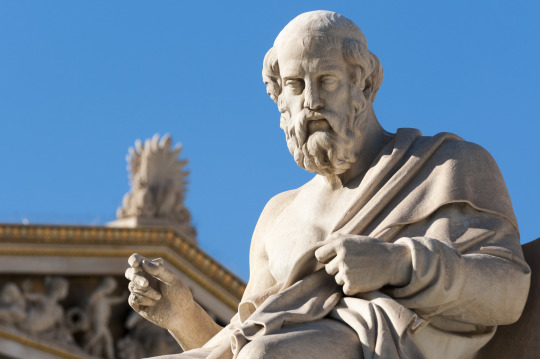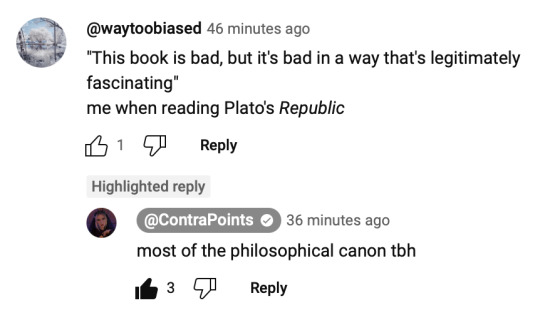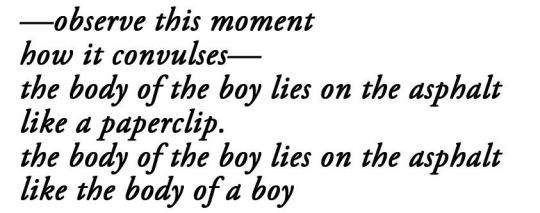#plato's republic
Text

x

You've heard it here first folks: Ari is a wild misogynist & Plato is an underrated feminist icon!
Yes, I'm technically an undergrad; no, I won't be taking any constructive criticism
#philosophy#plato#aristotle#shitposting#tagamemnon#greek philosophy#ancient history#athens#ancient greece#plato's republic#classics#classical studies#classics memes#philosophy memes#thesis#though I'll give to Aristotle that it has interesting possible implications for trans rights I guess?
11 notes
·
View notes
Note
what's your take on platos ring of gyges?
Oh man fuck Plato all my gurlies hate plato.
The only thing I will grant him is he is completely justified in wanting to be handled so roughly by a strong woman; but otherwise fuck plato.
I think that the Ring of Gyges is a very good thought experiment!! but fuckin, like ok Plato uses this to set up one of two opposing arguments that he then folds into his shitass plan for an ideal society.
If I remember correctly, Plato's version is slightly different from the traditional telling of the story, but I feel like it just feeds into his view of intention and ordering of the spirit as being preeminent.
Ok, I'm getting my copy of the Republic I want to give an answer correctly b/c I know Plato disagrees with uhhh was it Thamystocles or something over how to interpret it.
Okay, so I am inclined to agree with Glaucon's view (he's the one who's telling the story to Socrates, Plato's super mega ultra smart self insert) where in the absence of any consequence, people will do what makes them happy, or what they want to do.
It might be because I've read Leviathan and have been tainted by the evil that is the modern field of Political Science, but I think that morals and laws and what have you don't come from some metaphysical place! It's just people agreeing to do things or not do things because they want to (it makes them happy) or they are being coerced not to (they don't want to be stopped from living a free life).
I am further willing to say that anonymity and the internet gives us something akin to the ring of gyges, and we can see the full breadth of individuals on it and how they interact with the invisibility of the ring!
Plato then proceeds to spend the rest of the book dicking around and dodging the question in an increasingly elaborate way before answering the different question "is the life of an unjust man worse than the life of a just man".
Anyway, yeah I think J R R Tolkein did the right thing in condemning the thing to Mount Doom.
8 notes
·
View notes
Text
Socrates definition of God, implies the existence of a being either just as powerful or even more so than god, whose only purpose is evil.
And I don't know which is worse, someone who arbitrarily pours good and evil on people or a being whose only sole purpose is to perpetrate evil.
#philosophy#socrates#plato's republic#also also#reading the part about city building was giving me serious Ves from Mech Touch vibes and now i wonder if there was any connection
3 notes
·
View notes
Text
Yknow I expected some weird shit in Platos Republic but "it is only right and natural for the Republic we are building to completely outlaw certain types of stories and music and were gonna spend a few hours discussing the specifics in detail" wasn't on my radar
3 notes
·
View notes
Text
if you ever worry about the current state of our world, remember that socrates was a proto-internet troll
3 notes
·
View notes
Text
"Wise men talk because they have something to say; fools, because they have to say something."

Plato was an ancient Greek philosopher born in Athens during the Classical period in Ancient Greece. In Athens, Plato founded the Academy, a philosophical school where he taught the philosophical doctrines that would later become known as Platonism
#Plato#Philosophy#Ancient Greece#Socratic dialogue#Dialogues#Idealism#Metaphysics#Epistemology#Ethics#Politics#Theory of Forms#Allegory of the Cave#Platonic love#Virtue#Knowledge#Soul#Education#Justice#Plato's Republic#Platonic philosophy#quoteoftheday#today on tumblr
3 notes
·
View notes
Text
I've been thinking for some time that I need to read something really meaty in Greek -- epigrams are all well and good, but sometimes a fellow wants steak instead of hors d'oeuvres. At the same time, I've made a mental list of "books I should have read long ago but haven't for some unknown reason". Combining the two, I'm embarking on Plato's Republic. I drew on bits and pieces of it for my dissertation, but I've never read it cover to cover in the original, and there's no time like the present.
11 notes
·
View notes
Text
THE RING OF POWER
Zach Reynolds
August 31, 2009
Phil 1301
Homework 1
Benefits of Being Unjust
In Book II of Plato’s Republic, Glaucon and Adeimantus put forth the theory that the life of an unjust person is better than the life of a just person because it is more rewarding in order to bait Socrates into arguing with them in defense of justice. They show Socrates a cynical view of justice and injustice that they claim to have found is common among the people. They develop their point in a number of ways: by telling the story of the shepherd boy, by comparing the theoretical lives of an absolutely corrupt, unjust man and that of an absolutely just man, by arguing that the gods can be persuaded to absolve and favor an unjust man through ritual and sacrifice, and by criticizing those who do preach justice for doing so only for the rewards.
The story of the shepherd boy tells of a shepherd who discovers a magic ring that grants him the ability to turn invisible at will. The shepherd boy discovers that with this power he can get away with doing injustice to anybody, and using his power he murders the King, takes his wife, and takes over the kingdom. According to Glaucon, who tells this story, even if there were two rings, one falling into the hands of a just person, and the other into the hands of an unjust person, that the outcome would be the same – the just person would not act any differently than the unjust person. His reasoning is based on his claim that it is always more advantageous to be unjust, and that the only reason why so many uphold the code of justice in the first place is because they are too weak to do injustice to others and get away with it, and because they fear suffering injustice onto themselves by others, and thus are using justice as a shield to hide behind. However, with the power to turn invisible, and thus do as many unjust deeds as one wants without facing the consequences for them, he argues that only an absolute fool would not take advantage of his newly discovered powers.
The second argument that Glaucon puts forth is the theoretical separation made between a completely just man, and a completely unjust man. In his demonstration, Glaucon argues that the unjust man would be a clever craftsman who would use guile to gain wealth and power through unjust means, while at the same time creating a false public image so that he appears to be just to everyone who knows him. He would enjoy the status of having a good reputation by pretending to be just, and also great wealth by participating in unscrupulous acts. Furthermore, Glaucon argues that even the gods would fall for the unjust man’s charade, or at any rate forgive him for it, because the Greek gods are easily won over through sacrifice and ritual. The just man, meanwhile, would make no attempts to create a good reputation for himself, and in fact Glaucon determines that it is absolutely necessary to strip the just man of everything but his justice in order to prove that justice alone is not enough to make the man’s life better than the unjust man’s. So, the just man does good, but he is not believed to be good. He is poor, has a bad reputation, and likely to be tortured and punished as if he were a criminal. Since he cannot afford to make adequate sacrifices to the gods, Glaucon argues that even they would favor the unjust man, and clearly the unjust man has the better life in this scenario, but it appears that he would be rewarded with a better afterlife also.
After making his separation, Glaucon’s brother, Adeimantus pipes in, saying that even those who teach justice teach it only for the rewards it brings. He uses the example of a father and his sons, claiming that even when the father tells his sons of justice, he praises not justice itself, but the rewards that justice brings: good reputation, honor, public office, marriage, wealth, etc. He seems to be arguing that nobody is just for the sake of simple justice, rather they act just for the selfish reason that they want to reap the benefits of the rewards that appearing to be just brings, not unlike the crook theorized in Glaucon’s argument. He also further elaborates on the proposition that the gods are easily swayed to favor those who are willing to spend money in order to appear pious, so that those who are unjust can escape punishment in their lives currently as well as in their afterlives in Hades simply by spending a fraction of the fruits of their injustices on sacrifices, rituals, and prayers.
Together, Glaucon and his brother Adeimantus paint a cynical caricature of reality in which justice is a farce, and all people really would rather behave unjustly because it is always to their advantage to do so as long as they can weasel out of the consequences. Though, of course, they do not necessarily agree with the arguments that they have put forth, it is only to elicit a reaction from Socrates that they do so. However, they face him with a daunting task, as from a materialistic viewpoint, it does appear that the life of the unjust person will always be better than that of the just person, and so it is up to Socrates to persuade the two brothers that the spiritual consequences are so great as to render all the material rewards of being unjust obsolete.
0 notes
Text
I hate philosophers as a rule, but I fuck with Socrates for being that annoying. He's committed to the bit.
1 note
·
View note
Text
The Slander Tag Is Back...For Some Actual Slandering
On this week of Novalis Uses the Slander Tag Appropriately...
I know I'm a bibliophile, but if I had to name one book I read and really didn't like, it would have to be Plato's Republic. That book was incredibly boring and it's basically just fanfiction about Socrates, which I initially thought was hilarious but turns out I hated. It's not good at all. Yes, it's good for philosophy but it's SO. FUCKING. DULL.
1 note
·
View note
Text
just finished the moooost stressful essay writing 'week' of my life. It was barely a week, given the fucked scheduling, I ended up writing the thing in two nights
Good news is I think I have a half decent six pager about why Socrates is sooooo horny for the immortal mind
#bzzt#plato's republic#socrates#wahoo!!! yay#it was so damaging I'm so glad that shit is over#the workload is unbelievable#I felt like my chest was going to explode from my heartbeat all week
0 notes
Text
The claim that Plato’s Republic is the reason we have democracy today sure is a claim.
I mean, it meets the technical definition.
0 notes
Text
It is imbued with a similar nativism.
"Nature via Nurture: Genes, Experience, and What Makes Us Human" - Matt Ridley
0 notes
Text

MOTHER NOTICED ME
170 notes
·
View notes
Text









why did you allow this?
― Ilya Kaminsky ("Deaf Republic"), Ocean Vuong ("Notebook Fragments"), Plato, Grave of the Fireflies
buy me a coffee
#war#web weavings#parallels#quotes#literature#ilya kaminsky#deaf republic#ocean vuong#plato#poetry#poems#studio ghibli#grave of the fireflies#dark academia#dark academia aesthetics#art#poem
3K notes
·
View notes
Text
Dick and Jason would totally have a debate about reading. Except it wouldn’t be about whether Dick could read or not, it would be about whether classical literature is better than philosophical texts and they would hate the other because Jason would say that philosophical texts are a bunch of phony ramblings from old men who had nothing better to do and Dick would get mad and say classical literature is only popular because it’s too messed up for its time period and therefore the only reason it’s remembered and not because it’s actually good. 30 mins later Tim walks into the room with Jason and Dick not even a centimeter apart and screaming into each others faces and takes a slow sip of coffee and says “programming books are the most fun to read.”
Dick and Jason turn their heads so slowly to look at him that with each movement their neck muscles positively creak with pure revulsion for him.
Later Jason sends a half a dozen photos to the Titans and Bernard of Tim’s most awkward poses and Dick sidles up to Bruce and convinces him that Tim has gotten to the point where his sleep is affecting him so much he’s not functioning properly so Bruce takes matters into his own hands.
#Tim was not happy about Jason or Dick#dick would have billions of cute photos of his siblings for him to coo over#only his siblings realize the blackmail potential of these photos#jason stole the photos and sent them because dick takes the worst photos of people and doesn’t realize that they’re not cute#dick would absolutely be into philosophy#the art of war and the prince by Machiavelli and ethics by Aristotle and the republic by plato#he knows how to manipulate people and he knows how to run a government canonically so he’d be very much into reading works#about moral and political dilemmas#dick grayson#nightwing#jason todd#red hood#tim drake#red robin#batfam
289 notes
·
View notes